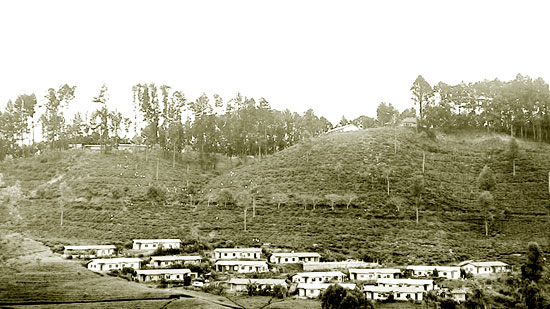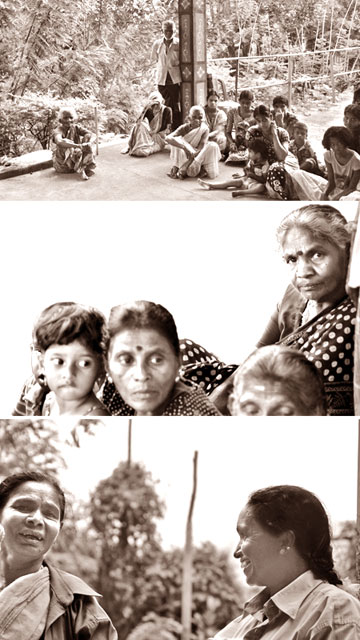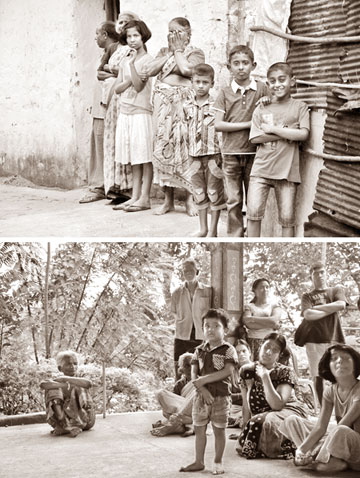Sri Lanka's forgotten 4.2 %
 Sri Lanka has long been synonymous with fine tea. With a plantation
history dating back to 1862 and an export value estimated to reach US$
2,500 million this year, the humble beverage is the island's pride
across the globe. Accounting for nearly 14% of the country's total
export earnings, it is among the nation's most valuable and prized
produce. Sri Lanka has long been synonymous with fine tea. With a plantation
history dating back to 1862 and an export value estimated to reach US$
2,500 million this year, the humble beverage is the island's pride
across the globe. Accounting for nearly 14% of the country's total
export earnings, it is among the nation's most valuable and prized
produce.
However, history has and might continue to overlook the most
important cogs in the large machine that is the tea industry of Sri
Lanka; the people without whose tireless labour this process would grind
to a screeching halt - the workers on the tea estates.
Descendants of South Indian labourers first sent here in the 19th and
20th centuries to work in the first British plantations, the 'up-country
Tamils' or 'Indian Tamils,' constitute 4.2% of the Sri Lankan
population.
Over the years, they have been marginalized by the very country that
they devote all their energy to. The Sinhala nationalism that fuelled
the Ceylon Citizenship Act of 1948 set such precise terms of identity
that even though they had lived on the island for decades, lack of
proper documentation meant they were not recognized as citizens of Sri
Lanka and left stateless.
A handful of agreements between India and Sri Lanka over next few
decades laid out plans to repatriate some, while granting citizenship to
a select few.
Finally, it was the J.R Jayewardene Government that came into power
in the 1970s that revised the Citizenship Act, adding in a Special
Provisions in the form of the Grant of Citizenship to Stateless Persons
of Indian Origin, accepting all remaining Indian Tamils as citizens of
Sri Lanka, equipping them with a nationality and a vote.
 The 'line' system that exists in estate housing is the same one
established in the late 19th century - a row of small houses, each more
similar in size to a single room, that share a roof. These were
initially meant to be temporary shelters for the workers yet estate
management over the years never sought to develop the living conditions
of the workers. The 'line' system that exists in estate housing is the same one
established in the late 19th century - a row of small houses, each more
similar in size to a single room, that share a roof. These were
initially meant to be temporary shelters for the workers yet estate
management over the years never sought to develop the living conditions
of the workers.
Each family is allocated one of these 'houses', meaning everyone
lives in uncomfortably close quarters, severely distorting family
dynamics. Should a child marry, reproduce and come to live in his/her
parents' house, as it does frequently happen, the situation worsens.
No address
Yet the estate worker is not the owner of his house, even though it
is that small. Since the plantation land belongs entirely to the estate,
the worker is not provided with a deed or permit that proves that the
house is his/hers. Should he plant a tree outside the line, even its
fruits would technically belong to the estate management.
Because of this system, where the housing comes under the control of
the management, individual houses are not provided with an address. This
results in administrative issues, problems for the police and issues
during voting.
The lack of an address also means important correspondence doesn't
reach the house - all mail must be addressed to the estate's head office
and is distributed at the management's convenience. Workers don't
receive time-sensitive EPF notices, students who persevere enough to
complete their AL education don't receive their university letters in
time and most personal correspondence never reaches the person it was
meant for.
Estates, being private lands, do not fall under the Pradeshiya Sabha
Act therefore local authorities do not have the power to provide
addresses in these areas as the roads too are the estate's property;
their maintenance is the responsibility of the estate.
This feeds into a range of obstacles in the worker's daily life.
Walking from their line house to the particular area of the plantation
they are required to work at, both places sometimes on two different
hills, is laborious enough without the badly-maintained road. The walk
back after a day's backbreaking work is hellish.
Classes in estate schools are limited and students who wish to study
further have to go into the main town. Hospitals, long since neglected,
are not adequate for all emergencies and again, they are forced to
resort to services in the town. Access to these are made additionally
time-consuming because the roads are so badly damaged and the limited
bus services available to estates are irregular.
Estate schools extend to Grade 5 or Grade 9 in most cases and
students who wish to study beyond that resort to making the journey from
the estate to the closest city to complete their education. Kids
talented in sports or the arts don't have as many options for
progression in their fields as a child in the town would. While most
schools would employ teachers who are specialists in their subjects to
teach children, some of the young women appointed to estate schools only
have the Advanced Level qualifications.
Though there are hospitals buildings in the estates, most of them
have fallen to disarray after years of neglect and those that do
function, can only administer treatment for the most basic ailments.
Surgeries and delivery of babies has to be done by trained doctors in a
town hospital.
 Health issues are constantly mounting in the cramped living
conditions. A single line with five or so houses share a wall and with
more than five people living in a single room, contagious diseases
spread rapidly. In addition, most estates don't have a proper toilet
system for the inhabitants of the line houses to use. Health issues are constantly mounting in the cramped living
conditions. A single line with five or so houses share a wall and with
more than five people living in a single room, contagious diseases
spread rapidly. In addition, most estates don't have a proper toilet
system for the inhabitants of the line houses to use.
No options
Water distribution in some plantations is such that the same water
used by lines higher up the mountain makes its way down a channel to the
lower divisions and the individuals there are left having to use water
that is far from pure. Even in places where this particular system is
not used, irregular water distribution methods and lack of basic hygiene
facilities contribute to prevailing health dilemmas.
The options available to women who wish to work outside the estate
are very limited. Aspiring to reach greater heights than the generations
before them, idealistic women look for jobs in Colombo - working in
someone's house or in a garment factory.
Their other option is to look for labour work abroad, which they
sometimes find difficult to adjust to because of the culture
differences. Eventually, most of them return only to marry and begin
their own families and start, inevitably, working on the estate.
Though some do make these journeys, some fall into the cycle of the
culture and are married as soon as they come of the legal age. Young
brides bear children at a young age and are thereby compelled to stop
schooling to take care of and provide for the children.
The consumption of alcohol by men, to beat the cold of shivering
temperatures around the mountains and as an antidote to a day's hard
work, has resulted in an increased number of cases of violence against
women and children.
This habit has spread among the women too. Because the communities
consume illicit alcohol that is not manufactured properly, sickness
results.
Lack of documentation
To approach the relevant authorities that could possibly help address
their concerns is also difficult for the workers; even though the
communities are Tamil, government agents appointed to offices in these
areas are mostly Sinhala and the language barrier creates more
confusion. Police stations, hospitals and other entities working
directly with the people are not able to communicate using the language
of the region's majority.
This is one of the many factors that contribute to lack of proper
documentation in the estate communities. Birth certificates are not
issued or don't carry accurate information, individuals do not have
national identity cards and when couples marry, they do not seek to
obtain a marriage certificate. Lack of awareness of the administrative
procedures due to being cut off from society reinforces these inactions.
However, superintendents hold back in giving work, asserting that the
leaves are not yet ready for plucking; this means some workers can't
fulfill the quota and thereby have their pay reduced. Estates have taken
to hiring workers on a 'temporary' basis, where they are paid by the
kilogram at a rate that is much lower than the wages of the permanent
worker; all far too little considering the harsh working conditions and
the denial of any other labourer benefits to the workers.
Over the years, the estate Tamils have been a community marginalized
by the state and mistreated by the corporations that employ them.
The distance from an estate to the nearest town and the tight working
schedules helps the estate management to keep them cornered from and
uneducated about society.
Unions, who should be advocating worker's demands for benefits, shy
away from their responsibility due to political influence.
These workers have not been made aware of the benefits they should be
receiving as employees and rights they are able to exercise as citizens
of Sri Lanka.
Story and pix: Centre for Policy Alternatives
|

